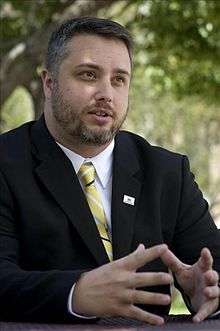Yes California

The Yes California Independence Campaign is an American political action committee that promotes the secession of the state of California from the United States via a referendum proposed for 2019.
"Yes California" and "Calexit"
Yes California formed in August 2015, succeeding the Sovereign California campaign.[1] The campaign adopted its name and logo from Yes Scotland, a campaign group from the 2014 independence referendum in Scotland.[2] The campaign has earned the nicknames Caleavefornia, Califrexit,[3] and Calexit, after Brexit, the United Kingdom's withdrawal from the European Union.[4]
Campaign
The Yes California Independence Campaign promotes the secession of the state of California from the United States.[5] It proposes including a measure for a referendum in 2019 on the state's 2018 gubernatorial election ballot.[6]
The campaign president is Louis J. Marinelli, who has served as interim chair of the secessionist California National Party.[4] The vice president is Marcus Ruiz Evans.[7] California has the sixth largest economy in the world and a population larger than Poland.[8] The campaign argues that California suffers under federal overregulation, that the state contributes more federal tax than it receives in federal funding, that the state feels isolated from political power in Washington, D.C.,[5] and that there is a wide gap between the political and cultural differences of California and the rest of the country.[4]
Background
There have been more than 200 proposals for the secession of California over the state's history.[9] The last instance of secession in the United States happened in 1861, when 11 states left the Union and formed the Confederate States of America. These states returned to the Union in 1865 after the Confederacy was defeated in the American Civil War. The Supreme Court decided in Texas v. White in 1869 that no state had the right to unilaterally leave the Union.[6] Secession would thus require the approval of 38 state legislatures and two-thirds majorities in both the US House of Representatives and Senate,[10] to pass a Constitutional amendment, as the Constitution provides no mechanism for state secession.[9] Analysts consider California's secession improbable.[10]
History
The hashtag #Calexit trended in social media as the campaign gained attention[10] in the wake of the election of Donald Trump to the presidency in November 2016;[4] California gave Hillary Clinton 61.5% of the vote to Trump's 33.2%.[11] Marinelli asserted this was evidence of the political divide between the state and nation, saying California is more progressive than the rest of the country and that Californians were offended by Trump's statements about minorities.[7]
The campaign staged protests outside the Capitol building in Sacramento after the November 2016 election, though its organizers asserted the protests were planned months in advance and would have been held regardless of who won the election.[12] The campaign has gained the support of public figures such as entrepreneur Jason Calacanis and California State Assemblymember Evan Low, and financial support from Silicon Valley investors such as Shervin Pishevar[3] and Dave Morin.[10] Immediately following the election, the campaign received 11,000 emails.[9]
On November 21, 2016, the Yes California campaign submitted an initiative for signature gathering which, if passed by voters in November 2018, would repeal Article III, Section 1 of the California Constitution, which states California is "an inseparable part" of the U.S., and require an independence plebiscite to be held on March 13, 2019 on the question of California's independence, the passage of which would require at a minimum 50% voter turnout and 55% voting yes.[13]
See also
- Texit – Texas secession movements
References
Works cited
- Associated Press staff (2016-11-11). "Trump's in, California's out? Longshot #CALEXIT bid gets boost". CBS News 8. Archived from the original on 2016-11-11. Retrieved 2016-11-11.
- Bollag, Sophia (2016-11-09). "Live updates after the 2016 election: Protests, concessions and rebounding stocks". Los Angeles Times. Archived from the original on 2016-11-11. Retrieved 2016-11-13.
- Evans, Marcus (November 21, 2016). "Calexit: The California Independence Plebiscite of 2019" (PDF). Initiatives - Active Measures. California Office of the Attorney General. Retrieved November 26, 2016.
- Gutierrez, Melody; Floum, Jessica (2016-11-12). "Drive for California secession gets bump from Trump election". San Francisco Chronicle. Archived from the original on 2016-11-13. Retrieved 2016-11-13.
- Hamblin, Abby (2016-11-09). "Calexit? Some California voters reject Trump, advocate 'secession'". The San Diego Union-Tribune. Archived from the original on 2016-11-10. Retrieved 2016-11-13.
- Lee, Seung (2016-06-25). "Calexit? Brexit Buoys California Independence Movement". Newsweek. Archived from the original on 2016-07-08. Retrieved 2016-11-10.
- McPhate, Mike (2016-11-10). "California Today: Secessionist Groups Seize the Moment". The New York Times. Retrieved 2016-11-13.
- Nevett, Joshua (2016-11-09). "Calexit: California to Leave US after shock Donald Trump election win". Daily Star. Retrieved 2016-11-14.
- Richardson, Valerie (2016-06-25). "Calexit or Caleavefornia? Brexit lifts Golden State independence campaign". The Washington Times. Archived from the original on 2016-06-26. Retrieved 2016-11-10.
- Robinson, Melia (2016-11-10). "People in California are calling for a 'Calexit' from the US in the wake of Trump's win". Business Insider. Archived from the original on 2016-11-11. Retrieved 2016-11-10.
- Robinson, Melia (2016-11-15). "It would be incredibly difficult for California to pull off a 'Calexit' and secede from the US". Business Insider. Archived from the original on 2016-11-16. Retrieved 2016-11-16.
- The Scotsman staff (2016-02-24). "Yes Scotland logo adopted by California independence movement". The Scotsman. Archived from the original on 2016-02-25. Retrieved 2016-11-17.
- Solon, Olivia (2016-11-09). "Silicon Valley investors call for California to secede from the US after Trump win". The Guardian. Archived from the original on 2016-11-10. Retrieved 2016-11-10.